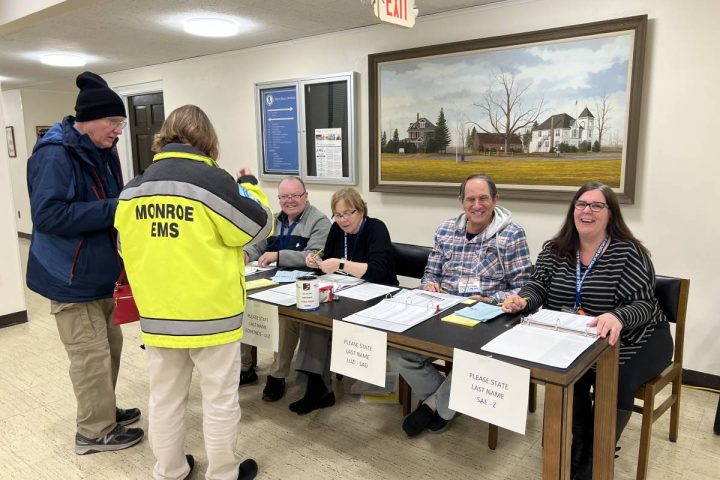HARTFORD, CT — A contentious zoning reform proposal calculating affordable housing needs was going to be mandated, but the bill narrowly approved in the early morning hours on Saturday turned it into a study, according to a press release issued by State. Rep. Tony Scott, R-Monroe, a ranking member of the Housing Committee.
This bill was brought out shortly before midnight Friday as an amendment to an unrelated bill.
“For about two hours, I asked questions, expressed concerns, and relayed to my colleagues what was included in this bill,” he said. “This has the state assessing the need for affordable housing, by town, for informational purposes. ‘Fair share’ is the first step toward implementing a policy that would weaken local control and impose one-size-fits-all housing solutions on towns.”
In a statement after the legislators’ actions the Open Communities Alliance (OCA), a Connecticut-based civil rights nonprofit organization that promotes access to opportunity for all people through education, organizing, advocacy, research, and partnerships, released a statement expressing optimism that a study will be done and disappointment over the bill being watered down.
Department of Housing officials did not offer testimony in support or opposition to this proposal.
“If this was so important for fair share, the department would testify,” Scott said. “The Department is not asking or pushing for this. The process starts with the Office of Policy and Management secretary to work on the metrics for each municipality. The 50,000-foot guidance is here, and they would have wide autonomy to create mandates.”
After OPM sets those metrics, it shall determine the minimum need for housing for each municipality.
“If the numbers are aspirational, there’s no action to it, then why do we need it?” Scott asked. “Because there will be something done with those numbers.”
“I worry about what will happen after that and the viability of local zoning boards or commissions,” he said. “These local decisions will be made by appointed bureaucrats, unfamiliar with local needs. We’re opening the door to the next step. We don’t know what that next step is, but we know there will be a next step.”
There will be a number assigned to each town, and that number will be acted upon.
“It’s not part of this legislation, but it’s the first step towards that,” Scott said. “The formula, devised by Open Communities Alliance, calculates each town’s need for additional affordable housing based on median income, poverty, multi-family housing stock and grand list.”
The biggest piece of this bill is about Fair Share, according to Scott.
“With this needs assessment, we’re going to be back in 18 months to assign numbers to each of our towns,” he said. “We’re also talking about relationships with tenants and housing providers in this bill. Some of the rules in here are going to be hurtful to landlords. If we’re taking housing providers out of the market because they don’t want to deal with the additional mandates, that’s going to cause a problem. This bill has put us on a path to removing rental units from the housing market.”
The following is the statement from OCA:
Today, a decision was made to pull the Fair Share Planning and Zoning proposal from an omnibus housing bill. The Fair Share proposal, which would have been a major step towards addressing Connecticut’s housing crisis, creating integrated housing choices, and kickstarting the state’s economy, was one of the most meaningful and outcome-focused zoning reform bills proposed nationwide.
With the hard work of many of the advocates, including the Growing Together Connecticut Consortium and the Greater Hartford Interfaith Action Alliance, and legislative partners including Rep. Luxenberg, Majority Leader Rojas, and Senators Looney and Duff – the bill advanced through the Legislature with its critical components intact. These core elements included a meaningful calculation of the need for affordable housing, a municipal planning process, and enforcement.
Unfortunately, after advancing out of the Housing Committee process largely intact, the Fair Share proposal was subsequently and consistently watered down. During those several months, we met with dozens of legislators and tried our best to address their concerns. We made significant concessions to them on almost every section of the bill, including the number of units to be built and the timeframe to implement the Fair Share plan. What we were not willing to compromise on was the notion that the bill needed to contain a meaningful enforcement mechanism that would have forced non-complying towns to do something meaningful. Without that, the entire concept doesn’t work.
To those who will claim “victory” about this development, you are responsible for perpetuating the housing crisis the state faces. You are holding back our economy, and for continuing to make Connecticut an unaffordable place to live for young people starting their first jobs, for middle-class workers who don’t make a ton of money, and for seniors who desperately want to stay in the communities they’ve lived in their entire lives. You are, even today, too often acting in violation of state statutes and the state constitution, which require towns to advance economic opportunity and to tackle segregation.
Despite our disappointment, this session provided a tremendous opportunity to educate policy leaders, stakeholders, and community members about Fair Share and to build a base of strong support for future advocacy. We connected to thousands of people across the state who believe that all towns should welcome people who need for affordable housing and when the towns refuse to do so, the state, which delegated the power to zone to towns to begin with, has an obligation to step in.
All respectful comments with the commenter’s first and last name are welcome.






I was born and raised on Long Island – home of the first development (Levittown). The overcrowding and high taxes ruined the area. So, 50 years ago when I was looking for a place to avoid overcrowding, I came to Monroe with its 1,2,and 3 acre zoning. Even with all the new homes that were built since 1973, Monroe still kept its small town feel. Legislation like this threatens that opportunity (that I have enjoyed) for future generations.
It’s a shame a press release was published verbatim. I thought this was an article (under the heading “News”), but it’s obviously just Mr. Scott’s words with no reporting, no comments from anyone else. This is really journalistic malpractice.
Valid point. The article has been revised to include a statement from OCA, which was in favor of the bill.
Thank you for updating the article.
The lack of affordable housing and the refusal of municipalities to allow for a meaningful number of units to be built will slowly kill the cities and towns in this state. The population of Monroe has tripled since 1960, but since 2000, it has actually declined. You simply cannot have vibrant communities and a full slate of public services with a declining population. With home values in Monroe averaging $500K, how any young family can move to the town is beyond me. This is simple economics. Build more housing.
Affordable housing would make Monroe better, period.